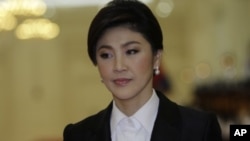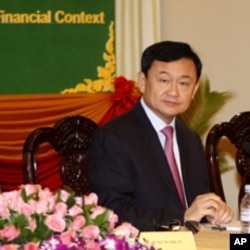Thailand’s government says it will review hundreds of prosecutions since the 2006 military coup that led to years of political turmoil. The cases under review are expected to include prosecutions of hundreds of protesters in Bangkok in recent years, corruption charges against former Prime Minister Thaksin Shinawatra and scores of people charged with defaming the royal family.
Thailand’s Prime Minister Yingluck Shinawatra said Tuesday that the government has agreed to review several years of political trials and an unspecified number of royal insult cases.
Truth for Reconciliation Committee
The announcement follows a recommendation for such a review from an independent panel called the Truth for Reconciliation Committee, or TRCT.
Thitima Chaisang, a government spokeswoman, says the government agrees that the prosecutions have been politicized.
"So, the government accepts the proposal of TRCT as the first step to reconciliation [of] the conflict of our nation," said Chaisang. "And, she would like, the Prime Minister, wants to solve the problem of the conflict of the country. So, that's why she needs to review all politicized criminal charges and lese majeste cases."
Defaming the monarchy
Lese majeste refers to Thailand’s laws against defaming the monarchy which are among the harshest in the world with a penalty of three to fifteen years in prison.
Thitima Chaisang says the review would include cases of both royalist Yellow Shirts who took over the airport and supported the 2006 coup as well as their opponents, the Thaksin-supporting Red Shirts.
However, the spokeswoman said the panel will not review changing any of the laws used to prosecute alleged offenses against the monarchy.
The lese majeste laws have been criticized by a wide range of academics and media freedoms groups. Since the military coup, researchers say there has been a 1,500% rise in such cases.
The prosecutions relate to Article 112 of the criminal code, which makes it illegal to say or do anything that defames, insults, or threatens the monarchy.
Anyone can raise charges of lese majeste and the police are obliged to investigate.
Internet
The vague provision is also enforced under the Computer Crimes Act, a law made to police the Internet that has also been labeled a political tool to silence free expression.
Shawn Crispin, Southeast Asia representative for the Committee to Protect Journalists, says the act is one of the most punitive Internet censorship laws in the world and needs to change.
"Without moves to re-establish press freedom across Thailand's political divide, Yingluck's inaction will lay bare the bogus claims to democracy her government's affiliated street movement campaigned on while in the political opposition," said Crispin.
Lese majeste charges are particularly potent in Thailand, where political analysts say fear of appearing disloyal to the country’s revered monarchy results in a high conviction rate.
Thai laws
Michael Connors, a professor researching Thai politics at Australia's Latrobe University and part of a group of international scholars that petitioned the government to review the laws, says the way the law has been abused to silence a wide range of political activists has led to an outcry that could lead to significant reforms.
“Five, six years ago it would have been hard to imagine the numbers of people who are now signing various petitions, who are speaking out at seminars, who are writing things on the web, and even several days ago the Bangkok Post had a massive feature about this issue," said Connors. "This was all unheard of five years ago. So, within five years there's been a complete shift in sentiment about this law and an emerging current demanding some kind of review so that it can't be abused for political purposes"
The defamation law is particularly problematic on the Internet, where Web site owners can be prosecuted for visitors’ online comments.
Computer Crimes Act
Chiranuch Premchaiporn was arrested and charged with lese majeste under the Computer Crimes Act for not quickly removing offending comments posted by bloggers on her website named Prachatai.
Online businesses are also pressuring the government over problems the law creates for commerce.
Earlier this month, the Asia Internet Coalition, an industry association founded by eBay, Google, Nokia, Skype and Yahoo!, raised concerns about the Computer Crimes Act.
"The current legal proceedings that are taking place in Thailand therefore raise the danger that the use of the Internet in Thailand will be substantially altered," said John Ure, the executive director of the coalition.
The group of Internet giants warned the charges against the Thai website operator could have a significant long-term impact on Thailand’s economy.





